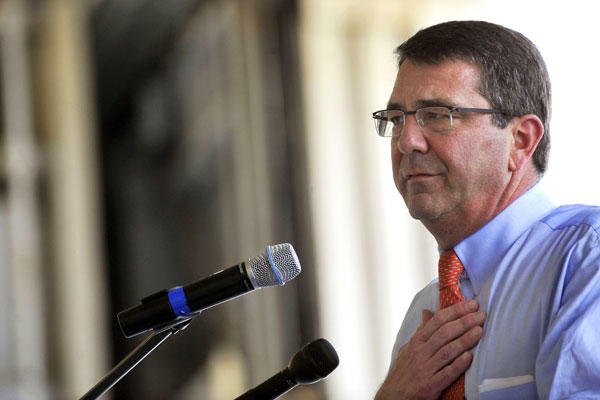Defense Secretary Ashton Carter told The American Legion on Tuesday that U.S. efforts to prevent Iran from becoming a nuclear power are not limited to the deal President Obama agreed to and which is now facing stiff political opposition.
"Our strategy toward Iran includes, but is not limited to the agreement," he told organization in remarks early Tuesday in Baltimore, where the Legion is holding an annual convention. "Let me say outright, this is a good deal."
Carter, echoing the words of Obama and Secretary of State John Kerry, who negotiated the deal for the U.S., said the agreement will eliminate a major source of risk and uncertainty in the region by limiting the prospect of a nuclear armed Iran.
The American Legion is scheduled to take up a resolution about the Iran agreement on Wednesday, spokeswoman Andrea Dickerson said.
Advocates for the deal say it will prevent Iran from building a nuclear weapon for up to 15 years by imposing restrictions and inspection requirements on the country's facilities. Under the terms of the agreement, Iran is to reduce the number of centrifuges at its Natanz and Fordow facilities from 19,000 to 6,104 for the next 10 years, with no enrichment allowed at the Fordow location. Iran has also agreed to use only its oldest model centrifuges.
Iran currently has enough uranium to build up to 10 nuclear bombs, according to the White House. The agreement requires it to reduce the stockpile by 98 percent and keep the level of uranium enrichment at less than 4 percent -- well below the level need for a bomb.
The administration insists that the inspection regimen in the agreement will prevent Iran from cheating, though critics say otherwise.
Sen. Bob Corker, a Republican from Tennessee and chairman of the Senate Foreign Relations Committee, has slammed the agreement and said he will vote against it. He said the inspection requirements, including giving Iran up to 24 days to prepare for an inspection by the International Atomic Energy Agency, has enough wiggle room to let the Islamic republic cheat.
"For a deal that must be built on verification and not trust, the inspections process is deeply flawed," Corker wrote last month in an op-ed in The Washington Post.
Carter told the Legion that "the deal places no limits whatsoever on our military," making the point made by other advocates that a military option is always on the table.
"We will continue to protect our friends in the region, especially Israel, from Iran's destabilizing activities," he said. "As I told some of the more than 35,000 American troops in the region when I visited last month: Deal or no deal, the United States military will remain 'full speed ahead.' "
In July, Obama made the case for the deal in a speech before the Veterans of Foreign Wars convention in Pittsburgh.
"With this deal, if Iran cheats, sanctions snap back on," he said. "Without a deal, the sanctions unravel. With this deal, we have a chance to resolve the challenge of Iran trying to get a nuclear weapon, peacefully. Without it, we risk yet another conflict in the Middle East."
The VFW, as it has for the past decade, approved a resolution calling on the White House and Congress to "do all within their power" to prevent all terrorist organizations and rogue nations from acquiring nuclear weapons.
Spokesman Joe Davis said the VFW has not come out in favor or opposed the deal, though it opposes Iran getting the bomb.
"There are a lot of things not to like about this deal, such as sample testing, the advance notice required before an onsite visit by IAEA inspectors, that the release of the four jailed Americans wasn't included, and that no mention was made of Iran's state sponsorship of terrorism in neighboring counties," he said.
Davis said the VFW has yet to come out for or against the Iran deal because it is still waiting to learn all the details. The issue is challenging for lawmakers, he said.
"The conundrum is they are going to get the bomb with or without this deal," he said. "So the question now is what makes the world and the region safer: Iran developing the bomb sooner or Iran developing the bomb later?"
-- Bryant Jordan can be reached at bryant.jordan@military.com.





























